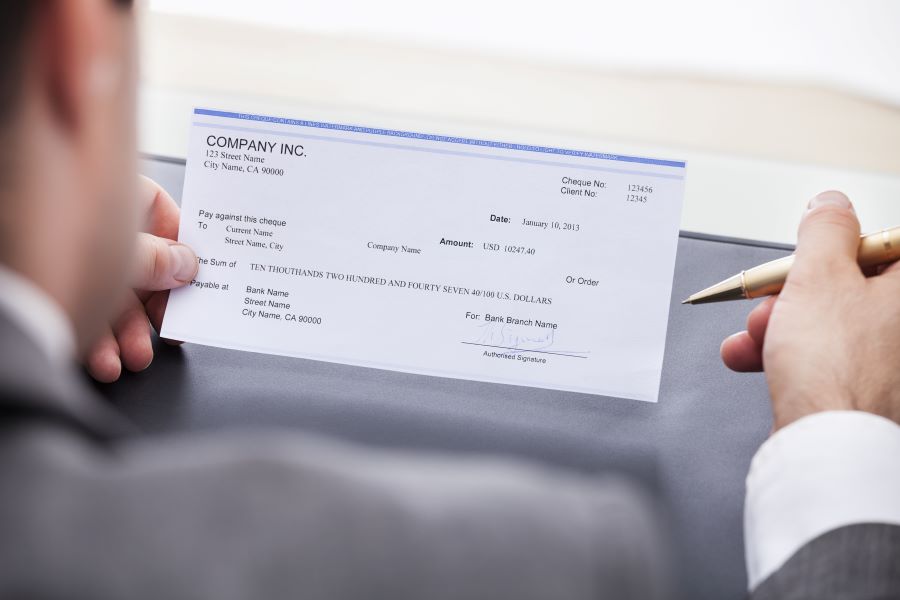In today’s digital age, where electronic payments are becoming increasingly popular, whether businesses should accept cheques still lingers. While cheques may seem outdated to some, they still play a role in certain industries and for particular customers. This article will consider accepting cheques as a form of business payment.
In recent years, credit card payments and electronic funds transfers have become the preferred methods of payment for many customers. These options offer convenience, speed, and security. However, there are still situations where accepting cheques may be necessary or beneficial.
Accepting cheques can be crucial for businesses that cater to an older demographic or operate in industries that rely heavily on physical activity, such as healthcare providers or clinical trials. Additionally, some individuals may prefer to use cheques to manage their finances or as an alternative to credit cards.
However, there are several considerations when deciding whether to accept cheques. These include the potential risk of fraud, the clearance times and associated service charges, and the extra administrative burden of processing and verifying cheques. Moreover, declining cheque payments may result in losing potential customers who prefer or rely on this payment method.
Is it illegal not to accept cheques?
While it is not illegal for businesses to refuse to accept cheques, the decision should be carefully considered. Refusing to accept cheques may have implications for certain types of businesses, particularly those in industries where customers may rely on this payment method.
Businesses need to understand the specific requirements and risks associated with accepting cheques. One major concern is cheque fraud, which can result in financial losses for businesses. By accepting cheques, businesses may need to implement additional security measures to mitigate the risk of fraudulent activities.
In addition, businesses should also be aware of any legal and regulatory requirements related to cheque acceptance. Certain industries or jurisdictions may have specific rules regarding accepting cheques, such as verifying the payee’s identity or adhering to specific cheque acceptance protocols.
While refusing to accept cheques may streamline payment processes and reduce the administrative burden associated with cheque processing, businesses should carefully weigh the potential benefits against the potential risks and implications. It may be beneficial to consult with legal and financial advisors to ensure compliance with applicable laws and regulations and to make an informed decision based on the business’s specific circumstances.
Is it practical to accept cheques?
Accepting cheques as a form of payment for your business involves certain practical considerations. On the one hand, cheques offer convenience for customers who may prefer this traditional payment method. On the other hand, accepting cheques has both advantages and disadvantages.
One advantage of accepting cheques is that it allows your business to cater to a wider customer base. Some individuals, particularly older or more traditional customers, may prefer paying by cheque. By accepting cheques, you can accommodate these customers and potentially increase your sales.
However, there are also disadvantages to accepting cheques. Firstly, processing cheques can be time-consuming and may require additional administrative tasks. For instance, you must verify the payee’s identity, ensure sufficient funds are in the payer’s account, and ensure the cheque is properly filled out. This can slow down your cash flow and take away valuable time from your employees.

Moreover, accepting cheques carries inherent risks. There is always a chance of receiving a bounced or fraudulent cheque, which can result in financial losses for your business. You may need to implement cheque verification services or stringent cheque acceptance protocols to mitigate this risk. This can add additional costs and complexity to your business operations.
It is easier to deposit cheques today.
It is easier to deposit cheques today due to advancements in cheque depositing methods and technology. Businesses now have access to various convenient deposit options, making the process quicker and more efficient.
One major advancement is the availability of mobile banking apps. These apps allow businesses to deposit cheques from anywhere, anytime, using a smartphone or tablet. This eliminates the need to visit a bank or ATM to make a deposit physically. With a few simple steps, businesses can take a photo of the cheque and submit it through the app. This saves time and reduces the risk of losing or misplacing cheques.
Another option available to businesses is remote deposit capture services. These services enable businesses to scan and deposit cheques electronically without needing physical transportation. With remote deposit capture, businesses can use a scanner or a mobile device to capture the cheque image and transmit it securely to the bank for processing. This eliminates the need for manual handling of cheques and can significantly streamline the deposit process.
Overall, these advancements in cheque depositing methods have made it easier and more convenient for businesses to deposit cheques. Whether through mobile banking apps or remote deposit capture services, businesses now have the flexibility to deposit cheques quickly and securely, allowing for smoother cash flow management.

Do your customers prefer cheques?
When considering customers’ payment preferences, it is important to consider the various payment systems available in today’s business environment. While cash, debit card payments, credit card payments, direct debit, and online payment services have become increasingly popular, some customers still prefer cheques.
There are a few reasons why customers may choose to use cheques. One reason is familiarity; some customers may have used cheques for a long time and feel comfortable with the process. Additionally, there may be specific circumstances where other payment methods are not feasible. For example, some businesses may not accept credit card payments or may charge a fee for using certain payment services. In such cases, customers may opt to use cheques instead.
Businesses must consider their customers’ preferences when deciding whether or not to accept cheques. While cheques may be less common and have some associated risks, they can still be a viable payment option for certain customers. Incorporating various payment systems, including cheques, can help businesses cater to the needs and preferences of a diverse customer base.


